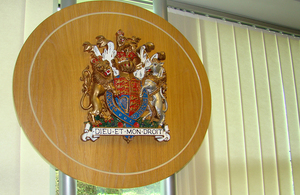- Government offers contracts to develop new antibiotics to treat deadliest diseases
- NHS patients could benefit from new antibiotic treatments as early as 2022
- New drugs will be paid for by world’s first ‘subscription-style’ payment model for antibiotics
The NHS is offering 2 contracts to pay pharmaceutical companies at the start of their work for access to innovative antibiotics, incentivising them to bring new classes of the drugs to patients across the UK for the first time in almost 30 years.
Of particular interest are antibiotics that can provide alternative treatment options for serious infections, such as bloodstream infections, sepsis and hospital-acquired pneumonia.
The high cost and low returns associated with antibiotic research and development makes it commercially unattractive. This is why the drugs will be paid for by the world’s first ‘subscription-style’ payment model for antibiotics and will be made available to UK patients as soon as possible, potentially as early as 2022.
Health Secretary Matt Hancock said:
The incredible discovery of antibiotics nearly 100 years ago transformed the health of our nation and our ability to combat infections. Diseases that were once a death sentence are now treated in just one small step.
But resistance to antibiotics is increasing and it’s imperative we take urgent action on a national and global scale to protect future generations.
This new way of buying antibiotics for patients in the NHS breaks down restrictive barriers to offer companies a vital springboard to foster innovation and develop potentially life-saving new products.
Professor Dame Sally Davies, UK Special Envoy on Antimicrobial Resistance, said:
Antibiotics underpin modern medicine and are integral for global health security. Governments and industry must work together to produce new antibiotics and ensure that we can continue to treat common diseases.
The UK is leading the way by encouraging companies to produce new antibiotics to stay one step ahead of life-threatening diseases.
The payment model, which was launched in July 2019, will pay pharmaceutical companies upfront for access to their antibiotic product, based on a product’s value to the NHS, rather than how much is used.
This aims to incentivise companies to invest in researching and developing new antibiotics, helping secure much-needed alternative treatment options for NHS patients.
Two drugs that have proven to be both safe and effective will be selected to undergo health technology assessment (HTA) by the National Institute for Health and Care Excellence (NICE) throughout 2021 using adapted methods for antimicrobials. The HTA will be used to decide the level of the subscription payment.
From this week, suppliers can register their interest for the scheme on NHS England’s eTendering Service.
The UK is at the very forefront of the global fight against antimicrobial resistance (AMR), launching its 5-year national action plan in 2019 and setting out its vision for AMR to be contained and controlled by 2040.
Yet, tackling AMR will require a global effort and the government is today calling for other countries to offer similar incentives in their own domestic markets.
Professor Stephen Powis, National Medical Director, NHS England said:
Staff across the NHS are already working with patients to ensure the antibiotics we have are used in the right way at the right time, and this new scheme is further important progress to develop new, life-saving antimicrobial medicines.
People’s lives depend on us having effective antibiotics and steps like this further reinforce how the NHS is leading the way in efforts to safeguard against the rise of superbugs.
Professor Gill Leng, Chief Executive, NICE, said:
We are witnessing the effects of one global pandemic, which has highlighted the threat of communicable disease. Alongside the threat of coronavirus is the increasing risk posed by antimicrobial resistance, exacerbated by a sparse antimicrobial development pipeline.
That is why we need to incentivise investment in innovative antimicrobial drug development as soon as possible. Along with our key partners, we have committed to develop and test innovative models for the evaluation and purchase of antimicrobials, applying advanced evaluation methods that recognise their full value to public health.
We hope that this project will inspire healthcare systems across the world to consider adopting similar models so that collectively, we deliver meaningful incentives that reinvigorate the global antimicrobial pipeline.
- The need to address the urgent issue of bringing new antimicrobials to market is widely recognised. Few new classes of antibiotic have been discovered since the 1980s and, for most antimicrobials, there are few replacement or alternative products in development and even fewer that target priority pathogens.
- The high cost and low returns associated with research and development of novel antimicrobials makes it commercially unattractive. In addition, pharmaceutical company revenues depend on volume of sales, potentially undermining antimicrobial stewardship initiatives.
- The UK is the first country in the world to announce it will test innovative models that pay companies for antimicrobials based primarily on a health technology assessment of their overall value to the NHS, as opposed to the volumes used.
- The subscription-style payment model will mean the NHS will have new drugs to call on when needed, while companies will be able to reliably forecast the return on their investment.
- A notice will be published on the Official Journal of the European Union website in the next 2 to 5 days.
- Once the notice is live, suppliers can register their interest via https://nhsengland.bravosolution.co.uk. Instructions and selection criteria will be published as part of this notice. Once released the procurement documents can also be found on the NICE website.
- Two procurement exercises will be run in parallel: one for an antimicrobial recently introduced to the UK market, and a second for a new antimicrobial with plans to launch in the UK before January 2021.
- The selection process has been designed to favour products which meet a key need in the UK while also addressing disease areas of international importance. Points will also be awarded for degree of novelty, surety of supply, the supplier’s demonstrated commitment to antimicrobial and environmental stewardship, and commitment to support surveillance.
- Products will be selected by the end of this year, and these selected products will progress to the HTA stage in 2021 to estimate the value of each product to the NHS. Contracts for the 2 antibiotic products are due to start in April 2022.
- The scope of the current procurement is the NHS in England. The expectation is that, if the project is successful, future rollout of these purchasing arrangements could be UK-wide.

